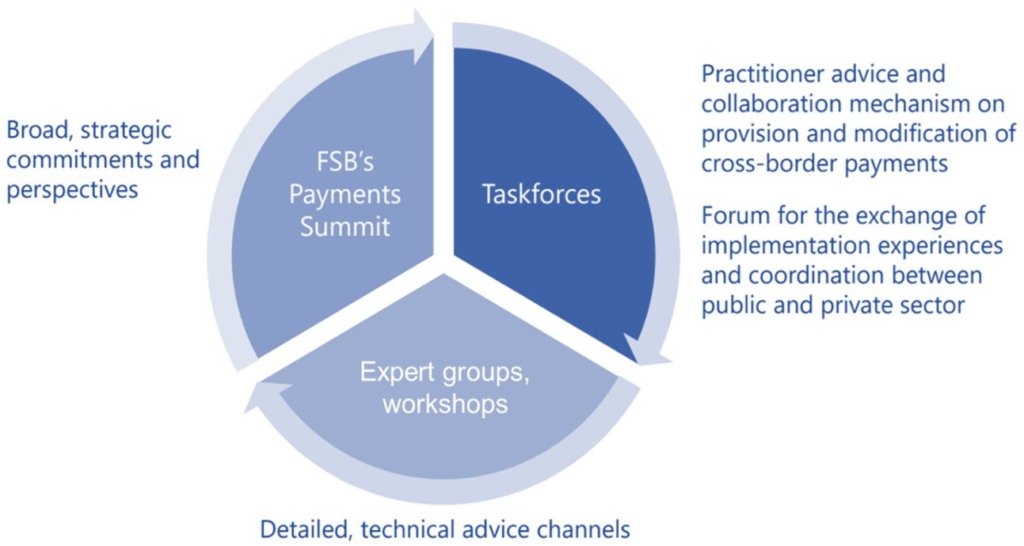Private-sector Engagement
Extensive engagement with the private sector has been integral to the Roadmap since its inception. With the advent of the priority actions, engagement with the private-sector engagement was strengthened to ensure it was occurring at all the necessary levels, from the technical to the strategic.
Annual payments summit
The FSB hosts Cross-border Payments Summits that bring together senior executives from the payments industry and senior policymakers to discuss strategic developments in cross-border payments and how the public and private sectors can further collaborate in taking forward the initiatives that are most likely to contribute to achieving the G20 targets by the 2027 target date (2030 for remittances).
The first Summit was held in October 2022 and the second in February 2024.
FSB Taskforce on Legal, Regulatory, and Supervisory matters
The FSB’s Taskforce on Legal, Regulatory, and Supervisory matters (LRS Taskforce) was established in 2023 and serves as a mechanism for regular engagement between the public sector and senior managers from the private sector that helps to support the implementation of the G20 Roadmap. LRS members are senior managers with significant experience and direct responsibilities related to cross-border payments in the areas of compliance, legal, cross-border operations or risk management. An important goal for the FSB is to have a diverse membership from a geographic and business perspective, both within the LRS taskforce and between the LRS taskforce and the complementary Bank for International Settlements’ Committee on Payments and Market Infrastructures (CPMI) Taskforce on Cross-border Payments Interoperability and Extension
The goal of the LRS taskforce is to strengthen private-sector participation in taking forward the G20 Roadmap by:
- providing input and feedback on frictions in legal, regulatory or supervisory frameworks related to the provision of cross-border payments and relevant data-related frameworks (e.g. how differences across standards relate to cross-border payments or in their regulatory implementation, or how a lack of harmonisation between data frameworks contribute to the challenges faced by cross-border payments)
- contributing to analysis of potential areas for action that could address the identified frictions
Meetings
Meeting |
Documents |
|---|---|
12 December 2025 |
|
30 June 2025 |
|
26 February 2025 |
|
22 April 2024 |
|
27 February 2024 |
|
18 September 2023 |
|
10 July 2023 |
|
Advisory Group to the Forum on Cross-border Payments Data
The FSB’s Forum on Cross-border Payments Data takes forward a key recommendation to Promote Alignment and Interoperability Across Data Frameworks Related to Cross-border Payments. To ensure that the Forum is informed by the experiences and expertise of cross-border payments market participants, an Advisory Group was established, which is composed of a diverse group of representatives in terms of geography, size and business model.
The Forum and the Advisory Group were established in 2025 and aim to address challenges related to the collection, storage, and management of payment-related data across borders. Differences in laws, regulations, and practices between countries can create unnecessary frictions in cross-border payments, increasing costs and risks for businesses and individuals. By bringing together regulatory authorities, data protection experts, and private-sector representatives, the Forum work to align data frameworks while ensuring compliance with anti-money laundering (AML), combating the financing of terrorism (CFT), and data privacy standards.
Working with competent international organisations, including with the Financial Action Task Force (FATF) and the Organisation for Economic Development (OECD), the Forum and Advisory Group serve as a platform for dialogue, collaboration, and research, helping to identify and address inconsistencies in global data frameworks.


